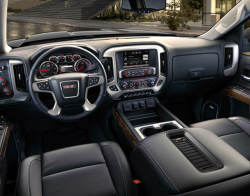
— Cadillac, Chevy and GMC air conditioning problems have caused a proposed class-action lawsuit that alleges the compressor and condenser lines cause the refrigerant to leak out and the air conditioners to blow hot air.
The General Motors air conditioning lawsuit includes Oklahoma consumers who purchased or leased any of the following GM vehicles:
- 2015-2017 Cadillac Escalade and Escalade ESV
- 2015-2017 Chevrolet Suburban
- 2015-2017 Chevrolet Tahoe
- 2015-2016 GMC Sierra Heavy Duty
- 2014-2017 GMC Sierra 1500
Plaintiffs William Taylor and Hayes Ellis claim GM's own documents prove the automaker knew about the air conditioner problems but failed to warn them when they purchased the vehicles.
According to the proposed class-action lawsuit, air conditioning components fail and allow the refrigerant to leak out, preventing the systems from blowing cold air.
In October 2014, Taylor purchased a new 2015 GMC Sierra that developed air conditioning problems in February 2017 when the truck had about 42,000 miles. The plaintiff took the Sierra to the dealer where technicians found the compressor to condenser line had failed. The dealership allegedly replaced the lines and hoses, installed a bracket and recharged the air conditioning system.
The plaintiff says he paid $444 because the vehicle was no longer covered under the warranty. Taylor says he also complained about having to pay for a bracket because it wasn't originally part of the air conditioning system.
Mr. Ellis says he purchased a new 2014 GMC Sierra that developed a problem with its air conditioning in February 2017 when the truck had about 80,000 miles. Ellis says he attempted to recharge the system several times and spent $80.00 on refrigerant, but the air conditioning system continued to leak refrigerant and was unable to hold the charge.
Eventually Ellis took his Sierra to the dealer where technicians determined the compressor and “manifold line” (another term for the compressor to condenser line) were leaking. The dealership replaced the compressor, installed a new compressor to condenser line, installed a support bracket and recharged the system.
Because the truck was out of warranty, the plaintiff says he was charged $1,197.30 for parts and labor.
The plaintiff says he didn't learn about the air conditioning defects until 2018 but by that time Ellis had already traded in his Sierra to a General Motors dealership in order to purchase a new vehicle.
The lawsuit says there are at least two defective parts of the air conditioning system, the first being the line leading from the compressor to the condenser. This line consists primarily of an aluminum tube connected to a rubber hose, but the plaintiffs claim the tube can disconnect from the rubber hose and allow the refrigerant to leak.
Additionally, the aluminum tube is allegedly defective because it can rupture and allow the leak to occur.
The lawsuit says GM realized the defects existed and stopped using the compressor to condenser lines originally installed in the vehicles.
As more evidence the automaker allegedly knew of problems, the plaintiffs reference a technical service bulletin (TSB PIT5331) issued to dealers in October 2014 where GM told technicians they should replace any damaged lines with newly designed lines and install brackets to hold the compressor to condenser lines in place.
However, the plaintiffs say owners must pay for these repairs if the vehicles are no longer covered by warranties.
According to the lawsuit, the air conditioner condenser is also defective, something the automaker knew because owners were sent letters in November 2017 that said certain vehicles:
“may have a condition where thermal cycling on the combination transmission fluid/oil and AC condenser cooler creates a crack that may allow refrigerant to escape. This condition consequently may deactivate the AC system….”
Certain Suburban, Tahoe and Yukon owners were also told GM would provide a warranty extension of 5 years or 60,000 miles, while Cadillac Escalades received protection for 6 years or 72,000 miles.
However, the lawsuit alleges Silverados and Sierras were not included in the warranty extensions and GM never offered to reimburse owners for failures of the condenser to compressor lines or the cost for installation of new brackets.
That means owners and lessees of Silverados and Sierras, such as Taylor and Ellis, did not receive warranty extensions.
The Chevrolet and GMC air conditioning lawsuit was filed in the U.S. District Court for the Western District of Oklahoma - William Taylor and Hayes Ellis, et al., v. General Motors Company, et al.
The plaintiffs are represented by Jones Brown PLLC, the Law Office of Ernest "Bo" Hopmann III, the Law Office of Richard Schechter PC, and Reich & Binstock LLP.
CarComplaints.com has owner-reported complaints about the GM vehicles named in the air conditioning lawsuit:




